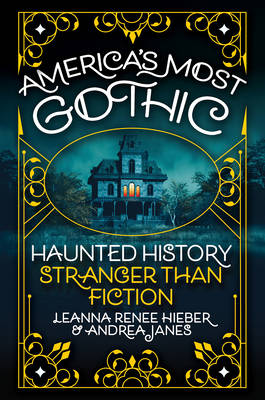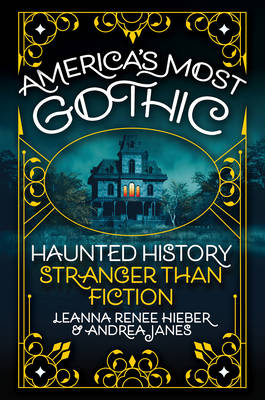
Bedankt voor het vertrouwen het afgelopen jaar! Om jou te bedanken bieden we GRATIS verzending (in België) aan op alles gedurende de hele maand januari.
- Afhalen na 1 uur in een winkel met voorraad
- In januari gratis thuislevering in België
- Ruim aanbod met 7 miljoen producten
Bedankt voor het vertrouwen het afgelopen jaar! Om jou te bedanken bieden we GRATIS verzending (in België) aan op alles gedurende de hele maand januari.
- Afhalen na 1 uur in een winkel met voorraad
- In januari gratis thuislevering in België
- Ruim aanbod met 7 miljoen producten
Zoeken
America's Most Gothic
Haunted History Stranger Than Fiction
Leanna Renee Hieber, Andrea Janes
Hardcover | Engels
€ 36,45
+ 72 punten
Omschrijving
Instant USA Today Bestseller From the Bram Stoker nominated author team who penned A Haunted History of Invisible Women, the first book of its kind to investigate gothic tropes that define American lore. Here is the hidden, dark history of what frightens us - and why. The Gothic. Brooding, atmospheric, chilling, and not always the outpouring of a feverish imagination. Reality can be even stranger as borne out in this lush and ghostly look at real people who lived--and died--amidst the trappings of the Gothic. Fog clinging to an isolated mansion. A dangerous patriarch or an overbearing matron. Locked doors and forbidden rooms. Whispers of murder and madness. And a woman shadowed by omnipresent threats. You've guessed it. You've stumbled into a Gothic tale, and it will haunt you like a ghost. We often think of the enduring tropes of the Gothic in terms of fiction and film--breath-catching escapes that tap into our fears, anxieties, forbidden desires, and unsettling dreams. But what if some of these chilly vibes are rooted in the experiences of real and tragic people who danced a macabre waltz with love and death? That's why we're here. Take the case of teenage Mercy Brown, victim--or was it predator?--of Rhode Island's vampire hysteria of the 1890s. Marguerite de la Roque, a French noblewoman condemned for "sexual crimes" to Canada's long-lost Isle of Demons. What happened to her and the barren landscape itself is the stuff of legend. And "Mad Lucy" Ludwell, the decidedly peculiar eighteenth-century high-society hauteur driven mad in the Virginia estate she prowls to this day. President Helen Peabody's spirit still stringently watches over her Women's College, now part of Ohio's Miami University. Ghosts of workers lost in horrific conditions while building the Hoosac Tunnel warn of imminent danger. Settle in. There are more. Welcome to the phantom ships, haunted academic halls, menacing landscapes, and family curses of America's Most Gothic--a tour of true spectral sightings and disordered minds. But beware: it's sure to get under your skin. The haunted--and haunting--figures herein want it that way.
Specificaties
Betrokkenen
- Auteur(s):
- Uitgeverij:
Inhoud
- Aantal bladzijden:
- 416
- Taal:
- Engels
Eigenschappen
- Productcode (EAN):
- 9780806543741
- Verschijningsdatum:
- 30/09/2025
- Uitvoering:
- Hardcover
- Formaat:
- Genaaid
- Afmetingen:
- 147 mm x 213 mm
- Gewicht:
- 453 g

Alleen bij Standaard Boekhandel
+ 72 punten op je klantenkaart van Standaard Boekhandel
Beoordelingen
We publiceren alleen reviews die voldoen aan de voorwaarden voor reviews. Bekijk onze voorwaarden voor reviews.









